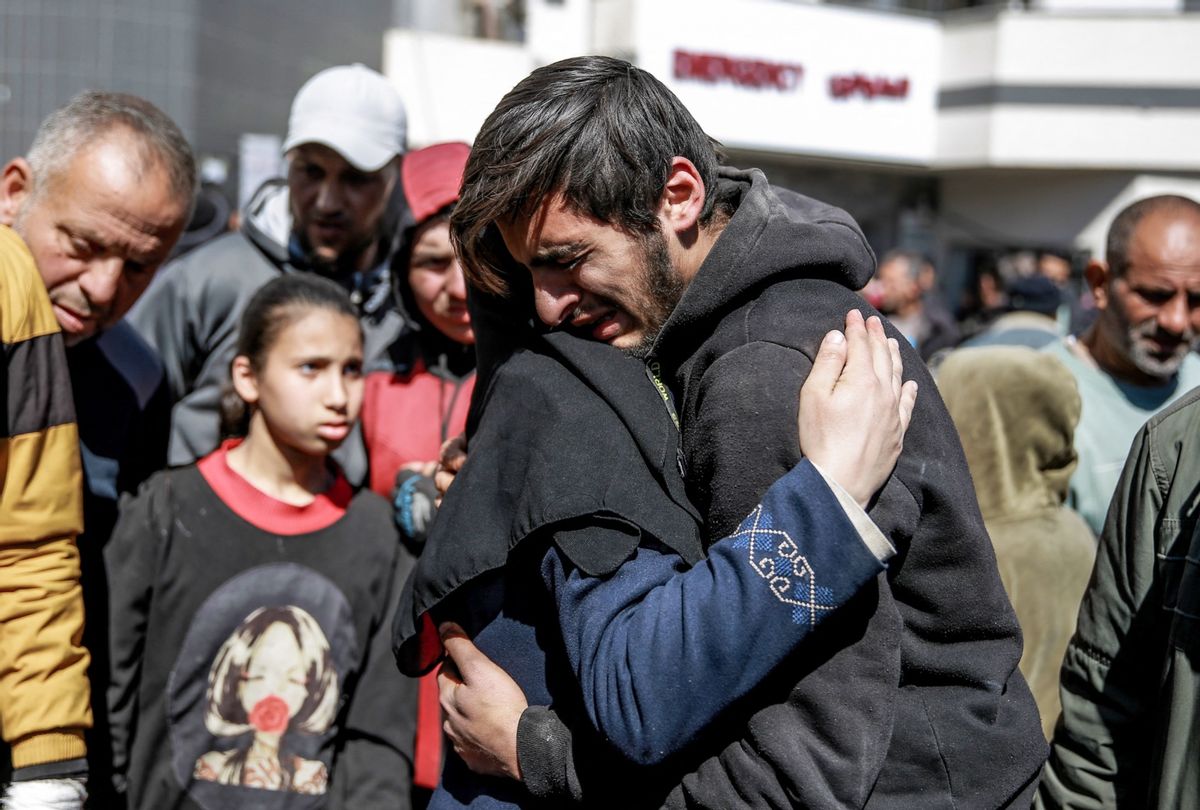The United States on Thursday unilaterally blocked a United Nations Security Council statement that would have expressed "deep concern" over the Israeli military's killing of Gazans seeking food aid earlier in the day, an attack that drew global condemnation.
According to Riyad Mansour, the Palestinian U.N. ambassador, the U.S. was alone among the Security Council's 15 members in opposing the statement, which Algeria put forth during an emergency session called after Israeli forces opened fire on a crowd gathered near a convoy of aid trucks in Gaza City.
Robert Wood, deputy U.S. ambassador to the U.N., indicated that the U.S. objected to the statement's assignment of blame to the Israel Defense Forces (IDF). A draft of the statement pointed to reports that "over 100 individuals have lost their lives, with approximately 750 others sustaining injuries due to opening fire by Israeli forces at a large gathering awaiting food aid."
"We don't have all the facts yet on the ground," Wood told reporters on Thursday. "We want to get that, and we want to find language that in some ways can make sure that we speak on this issue but in a way that ensures that we have done the necessary due diligence with regard to culpability on all this."
Witnesses, including medics who arrived on the scene, described horrifying carnage, with dozens killed or wounded by gunshots lying near blood-soaked sacks of flour. Others were likely hit by aid trucks as they sped away, and one journalist reporting from the scene in northern Gaza said Israeli tanks ran over many injured people.
Israeli officials have attempted to blame the deaths on a "mob" of Palestinians that "stormed" the aid trucks.
"When you say mob, do you mean starving people who have been deprived of food because you haven't let the aid in?" Channel 4 anchor Cathy Newman asked an Israeli military spokesperson on Thursday.
In an attempt to bolster its version of events, the U.S.-backed IDF released drone footage showing people surrounding aid trucks on a road in northern Gaza.
But as The New York Times observed, the footage "was edited by the Israeli military with multiple clips spliced together, leaving out a key moment before many in the crowd start running away from the trucks, with some people crawling behind walls, appearing to take cover."
Separate footage posted to social media by Al Jazeera shows the moment Israeli forces started opening fire early Thursday morning:
Omar Shakir, Israel and Palestine director at Human Rights Watch, said Friday that while a "full accounting" of the incident is needed, Israel's military "can't evade responsibility by saying order broke down—they're obliged as occupier to restore public order."
"Israel is starving Palestinians—a war crime," Shakir said, adding that there is "no doubt Israel [is] responsible for creating catastrophic conditions that led to yesterday's killings."
Médecins Sans Frontières (MSF), also known as Doctors Without Borders, echoed that assessment, saying in a statement Thursday that "we consider Israel responsible for the situation of extreme deprivation and despair which prevails in Gaza, particularly in the north, which led to today's tragic events."
"This situation is the direct result of the string of unconscionable decisions taken by Israeli authorities while waging this war: a relentless bombing and shelling campaign, a complete siege imposed on the enclave, the bureaucratic hurdles and lack of security mechanisms to ensure safe food distribution from southern to northern Gaza, the systematic destruction of livelihood capacities such as farming, herding, and fishing," the group said.
Humanitarian aid deliveries to the besieged Gaza Strip have declined sharply in recent weeks as malnutrition and infectious diseases have spread rapidly across the territory. Human rights organizations have accused the Israeli government of deliberately obstructing aid shipments, a blatant violation of the International Court of Justice's binding interim ruling last month.
Ramesh Rajasingham, deputy chief of the U.N. Office for the Coordination of Humanitarian Affairs, told Security Council members earlier this week that "if nothing is done, we fear widespread famine in Gaza is almost inevitable and the conflict will have many more victims."
Martin Griffiths, the U.N.'s emergency relief coordinator, said Thursday that he was "appalled at the reported killing and injury of hundreds of people during a transfer of aid supplies."
"This comes as the death toll across Gaza since October 7 hits the 30,000 mark," Griffiths added. "Life is draining out of Gaza at terrifying speed."



Shares